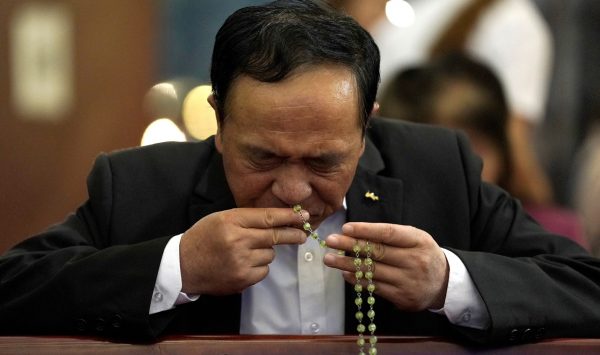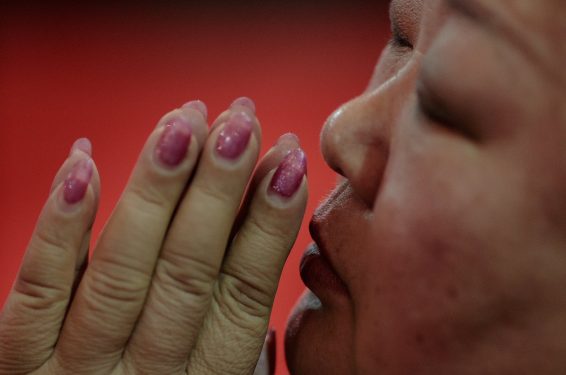
WINDSOR TERRACE — Imagine everyone in the U.S. — about 330 million people — lived under escalating and frequently violent religious persecution.
An estimated 340 million Christians worldwide face persecution for their beliefs, according to data from Aid to the Church in Need (ACN). Officials at this Catholic charity are concerned that people might become numb to that magnitude.
But a recent ACN United States survey of 1,000 Catholics nationwide carries both good news and a challenge.
First, the good: 57 percent of the people surveyed said they believe persecution of Christians globally is “very severe” — up from 41 percent a year ago. Also, 67 percent say they are “very concerned” about the issue.
And the challenge: This survey also found that U.S. Catholics are not well informed about the individual instances of persecution, like Boko Haram’s 2014 mass-kidnappings of 276 schoolgirls in Chibok, Nigeria.
Of that original group, an estimated 112 of the abductees are still missing, said Ed Clancy, director of outreach for ACN United States (ACNUSA).
“You’d think most people would know that, but most people didn’t,” Clancy said. “Part of it is because of an inundation — as in, ‘There is only so much I can absorb.’ And the secular press doesn’t always prioritize this.
“Our goal is to raise awareness and, more importantly, help the people under persecution.”
Brooklyn-based ACNUSA is a Catholic charity under Pope Francis’ guidance to bring humanitarian and pastoral relief to 5,000 projects worldwide.
The group’s fourth annual nationwide poll examining the views of 1,000 U.S. Catholics on the global persecution of Christians was conducted in February by McLaughlin & Associates.
This year’s survey also showed that nearly 50 percent of U.S. Catholics believe that Christians are the victims of half or more of the world’s attacks based on religion.
The leading persecutor, according to respondents, was China, where Catholics practice their faith in “underground” parishes. North Korea and Pakistan followed in the ranking.
For example, Clancy said that 1,000 under-age Christian girls were abducted last year in Pakistan and forcibly converted to Islam. But the Catholics responding to the survey did not seem to know about those attacks, Clancy said.
Back in Nigeria, at least 3,500 Christians died from October 2019 to October 2020. These deaths resulted from violent clashes with roving bands of Fulani cattle herders and other attackers.
Not many people seemed to know that Christians in North Korea risk imprisonment and torture for professing faith, Clancy said.
“There’s a very short attention span oftentimes when these things happen,” he added. “But putting faces with the numbers is very important. It’s important to provide the story, so it represents a person.”

With that momentum, ACNUSA hopes people would be “more active or responsive to do something,” Clancy said.
Such actions could include writing to elected officials urging action from the U.S. government. For example, economic sanctions or other measures could follow unheeded requests to protect Christians in nations where persecution is allowed to persist.
Another step would be making donations to ACNUSA and similar organizations that advocate for the persecuted church, Clancy said.
Plus, he added, knowing the plights of victims, like the girls in Nigeria or Pakistan, shows who needs prayer.
The survey also revealed that 52 percent of U.S. Catholics believe Pope Francis is “very engaged” in speaking up for the persecuted church. That number is up from 47 percent a year ago.
Joop Koopman, the ACNUSA spokesman, said the polling happened simultaneously during publicity for the Holy Father’s planned trip to Iraq, which occurred a few weeks ago.
Koopman said the timing of that news coverage might have nudged more awareness about Christian persecution.
The survey also showed that 30 percent of respondents believed their dioceses’ bishops were very engaged in discussing persecution. Also, 28 percent believe their parishes were very involved in calling attention to attacks on Christians.
But that also means only a third of the survey-takers knew whether their bishops and pastors ever discussed persecution abroad.
“The poll shows the great need to inform the public regarding specific instances of Christian persecution,” said George Marlin, ACNUSA chairman. “The U.S. bishops and organizations like our own must step up our educational and informational efforts.
“It is my hope that leaders around the world embrace the fundamental human right of religious freedom and promote a society that respects ethnic, cultural and especially religious diversity.”
